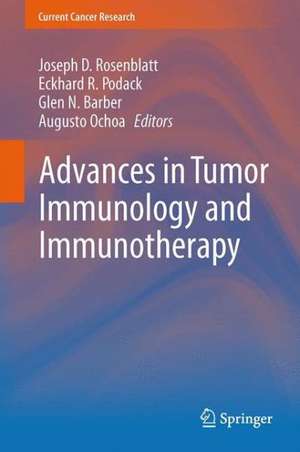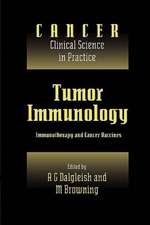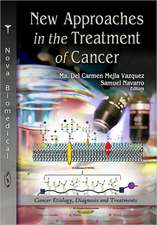Advances in Tumor Immunology and Immunotherapy: Current Cancer Research
Editat de Joseph D. Rosenblatt, Eckhard R. Podack, Glen N. Barber, Augusto Ochoaen Limba Engleză Hardback – 25 oct 2013
Enhanced understanding of mechanisms underlying T-cell anergy such as arginine deprivation, immunosuppressive cytokines, defective innate and interferon response pathways, and NKG2D downregulation have all provided new insight into suppression of anti-tumor immunity and tumor evasion.
In addition to emerging understanding of tumor evasion, new immune targets such as CTLA4 blockade, NK stimulatory receptors, manipulation of the antigen processing and presentation, cytokine and costimulatory responses all provide new possibilities for enhancing anti-tumor immunity even in tumors previously felt to be resistant to immune attack. Several of these strategies have already been realized in the clinic. The volume will explore evolving paradigms in antigen presentation, dendritic cell biology, the innate response and immunosuppressive mechanisms, and emerging strategies for manipulation of the immune system for therapeutic benefit that have realized success in neuroblastoma, leukemia, melanoma, lung cancer, and allogeneic transplantation. Early successes as well as failures will be highlighted to provide a snapshot of the state of clinical immunotherapy with an eye to future possibilities such as combination therapies, adoptive T-cell transfer, and the retargeting of immune cells via T-cell receptor engineering.
| Toate formatele și edițiile | Preț | Express |
|---|---|---|
| Paperback (1) | 1098.99 lei 43-57 zile | |
| Springer – 23 aug 2016 | 1098.99 lei 43-57 zile | |
| Hardback (1) | 1112.17 lei 43-57 zile | |
| Springer – 25 oct 2013 | 1112.17 lei 43-57 zile |
Din seria Current Cancer Research
- 5%
 Preț: 1132.09 lei
Preț: 1132.09 lei - 5%
 Preț: 1609.56 lei
Preț: 1609.56 lei - 5%
 Preț: 728.66 lei
Preț: 728.66 lei - 5%
 Preț: 1421.21 lei
Preț: 1421.21 lei - 5%
 Preț: 1094.08 lei
Preț: 1094.08 lei - 5%
 Preț: 1089.85 lei
Preț: 1089.85 lei - 5%
 Preț: 1481.57 lei
Preț: 1481.57 lei - 5%
 Preț: 1094.80 lei
Preț: 1094.80 lei - 5%
 Preț: 1447.73 lei
Preț: 1447.73 lei - 5%
 Preț: 706.97 lei
Preț: 706.97 lei - 5%
 Preț: 1096.81 lei
Preț: 1096.81 lei - 5%
 Preț: 1098.48 lei
Preț: 1098.48 lei - 5%
 Preț: 714.63 lei
Preț: 714.63 lei - 5%
 Preț: 1297.22 lei
Preț: 1297.22 lei - 5%
 Preț: 1100.64 lei
Preț: 1100.64 lei - 5%
 Preț: 1103.95 lei
Preț: 1103.95 lei - 5%
 Preț: 715.35 lei
Preț: 715.35 lei - 5%
 Preț: 1171.03 lei
Preț: 1171.03 lei - 5%
 Preț: 902.44 lei
Preț: 902.44 lei - 5%
 Preț: 1608.47 lei
Preț: 1608.47 lei - 5%
 Preț: 1438.78 lei
Preț: 1438.78 lei
Preț: 1112.17 lei
Preț vechi: 1170.71 lei
-5% Nou
Puncte Express: 1668
Preț estimativ în valută:
212.81€ • 222.79$ • 176.09£
212.81€ • 222.79$ • 176.09£
Carte tipărită la comandă
Livrare economică 07-21 aprilie
Preluare comenzi: 021 569.72.76
Specificații
ISBN-13: 9781461488088
ISBN-10: 1461488087
Pagini: 400
Ilustrații: IX, 371 p. 35 illus., 29 illus. in color.
Dimensiuni: 155 x 235 x 23 mm
Greutate: 0.86 kg
Ediția:2014
Editura: Springer
Colecția Springer
Seria Current Cancer Research
Locul publicării:New York, NY, United States
ISBN-10: 1461488087
Pagini: 400
Ilustrații: IX, 371 p. 35 illus., 29 illus. in color.
Dimensiuni: 155 x 235 x 23 mm
Greutate: 0.86 kg
Ediția:2014
Editura: Springer
Colecția Springer
Seria Current Cancer Research
Locul publicării:New York, NY, United States
Public țintă
ResearchTextul de pe ultima copertă
This volume explores recent advances in understanding of fundamental immunology and insights into the dynamic interactions between tumors and the immune system, that provide new opportunities for therapeutic intervention in cancer. Chapter topics include evolving paradigms in the innate and adaptive response, newly appreciated immunosuppressive mechanisms, and novel preclinical strategies for manipulation of the immune system for therapeutic benefit in cancer. In addition, recent successes in the clinic, and emerging opportunities are covered. Future possibilities, such as the use of antibody engineering, fusion proteins, and the retargeting of immune cells through T-cell receptor engineering are discussed by leaders in the field, focusing on recent clinical experience, promising technologies, and challenges to clinical success.
Caracteristici
Most up-to-date volume that explores evolving paradigms in antigen presentation, dendritic cell biology, the innate response and immunosuppressive mechanisms, and emerging strategies for manipulation of the immune system for therapeutic benefit that have realized success in neuroblastoma, leukemia, melanoma, lung cancer, and allogeneic transplantation Highlights early successes as well as failures to provide a snapshot of the state of clinical immunotherapy with an eye to future possibilities such as combination therapies, adoptive T-cell transfer, and the retargeting of immune cells via T-cell receptor engineering Enhanced understanding of mechanisms underlying T-cell anergy such as arginine deprivation, immunosuppressive cytokines, defective innate and interferon response pathways, and NKG2D downregulation have all provided new insight into suppression of anti-tumor immunity and tumor evasion







